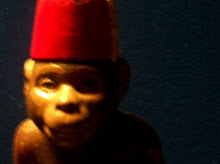As mentioned previously, young Susan Bradford Eppes observed a performance by Blind Tom on February 20th 1864. She was excited at the prospect and by an invitation she was forced to turn down:
"Blind Tom is to play at the Capitol tonight. We are going to hear him for he is too wonderful to miss. I am staying at Aunt Margaret's. Cousin Jim will take Mart and Sue and me to town. It is not very far and I had an invitation to go from a captain in a gorgeous uniform. I would have liked to go with him but Mother does not like us to go around without a chaperon. If I was at Goodwood, Aunt Sue would go; she is the very best aunt a girl ever had."
After the concert she provided this description in her diary:
Blind Tom is wonderful! He plays the Battle of Manassas and, before he begins to play, his master tells you how Tom came to compose this piece. His master, Colonel Bethune, is so proud of him and Tom loves him and is so affectionate; just like some sweet-tempered animal that you have petted.
This Battle of Manassas begins with the booming of cannon; the rattle of musketry and above all the clear notes of the bugle. Faintly in the distance the strains of Dixie float upon the air, these strains grow louder and louder and mingle with the clashing of guns, the tramping of horses and the sharp commands of officers. He intersperses the music with the names of the different Generals, who took the most prominent parts in the day's work. How an imbecile (for Tom is plainly that) could ever be taught a connected description of Manassas, is certainly a miracle.
So who was Blind Tom? His story is amazing.
Blind Tom was born into slavery and was given the name Thomas Bethune, Bethune being the name of his new owner. Later his name would become Thomas Wiggins. By all accounts Tom was an
autistic savant with an amazing, if not miraculous, musical ability. While his vocabulary was said to consist of little more than 100 words, he had a musical repertoire of some 7,000 compositions, many of which he had composed himself. Mark Twain saw him perform and was fascinated; he made an effort to see Tom perform whenever possible. As young Susan describes, Tom composed pieces for the piano that attempted to recreate civil war battles. One of the most well known performers of his day, Tom made his owner Colonel Bethune (his "manager" after the emancipation proclamation and the end of the civil war) a small fortune. He was undoubtedly exploited but almost certainly was able to live a better life because of his prodigious musical talents. He died at the age of 59 in 1908.
Here is his obit from the NYTimes.


